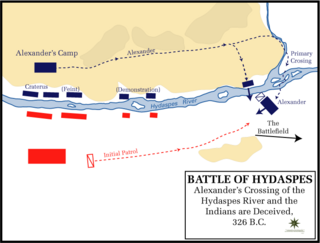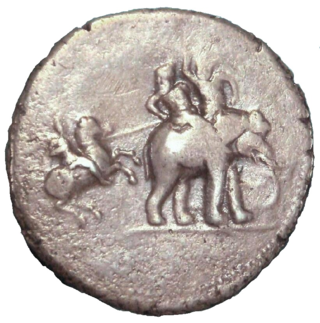Queen or QUEEN may refer to:

Year 326 BC was a year of the pre-Julian Roman calendar. At the time, it was known as the Year of the Consulship of Visolus and Cursor. The denomination 326 BC for this year has been used since the early medieval period, when the Anno Domini calendar era became the prevalent method in Europe for naming years.

Porus or Poros was an ancient Indian king whose territory spanned the region between the Jhelum River (Hydaspes) and Chenab River (Acesines), in the Punjab region of the Indian subcontinent. He is only mentioned in Greek sources.

The Battle of the Hydaspes was fought between Alexander the Great and Porus in May of 326 BC. It took place on the banks of the Hydaspes River in Punjab, as part of Alexander's Indian campaign. In what was possibly their most costly engagement, the Macedonian army secured a decisive victory over the Pauravas and captured Porus. Large areas of Punjab were subsequently absorbed into the Macedonian Empire; Porus was reinstated as the region's ruler after Alexander, having developed a newfound respect for the fierce resistance put up by Porus and his army, appointed him as a satrap.
Siren or sirens may refer to:

The Pauravas were an ancient tribe in the Indus valley, to which King Porus may have belonged.

Eudemus was one of Alexander the Great's generals. In 326 BC he was appointed by Alexander as one of the commanders of the troops in India along with Peithon, Porus and Taxiles. After Alexander's death, Eudemus assassinated Porus and effectively controlled Alexander's northern Indian territories until he became involved in the Wars of the Diadochi during which he was captured and killed by Antigonus.
Abisares, called Embisarus (Ἐμβίσαρος,) by Diodorus, was an Indian king of Abhira descent whose territory lay in the river Hydaspes beyond the mountains. On his death in 325 Alexander appointed Abisares' son Curtis as his successor.
Nicaea, Nicea, Nikaea or Nikaia may refer to:
Atalanta is a heroine in Greek mythology.

Dhana Nanda, according to the Buddhist text Mahabodhivamsa, was the last ruler of the Nanda dynasty of ancient India. He was the youngest son of Mahapadma Nanda.

Stateira, possibly also known as Barsine, was the daughter of Stateira and Darius III of Persia. After her father's defeat at the Battle of Issus, Stateira and her sisters became captives of Alexander of Macedon. They were treated well, and she became Alexander's second wife at the Susa weddings in 324 BC. At the same ceremony Alexander also married her cousin, Parysatis, daughter of Darius' predecessor. After Alexander's death in 323 BC, Stateira was killed by Alexander's other wife, Roxana.
Olympus or Olympos may refer to:
Shashigupta IAST: Śaśigupta was a ruler of Paropamisadae, between the Hindu Kush mountains and Indus Valley during the 4th century BCE. The name Shashigupta is a reconstruction of a hypothetical Indo-Aryan name, based on a figure named in ancient Greek and Roman sources as Sisikottos (Arrian), and Sisocostus (Curtius).

The Indian campaign of Alexander the Great began in 327 BC and lasted until 325 BC. After conquering the Achaemenid Persian Empire, the Macedonian army undertook an expedition into the Indian subcontinent. Within two years, Alexander expanded the Macedonian Empire to include present-day Punjab and Sindh, surpassing the earlier frontiers that had been established by the Persian conquest of the Indus Valley.

Chandragupta Maurya is an Indian Historical drama series being broadcast on Dangal TV, based on the life of Chandragupta Maurya, an Indian emperor of ancient India and the founder of the Mauryan Empire. Chandragupta Maurya was first aired in March 2011 on Imagine TV. Ashish Sharma played the role of adult Chandragupta Maurya.

Porus is a historical drama television series based on the Battle of the Hydaspes, visualizing the lives of Indian warrior and ruler Porus, King of the Paurava Kingdom and Alexander the Great, King of Macedonia. It aired from 27 November 2017 till 13 November 2018 on Sony Entertainment Television. Another historical drama Chandragupta Maurya replaced it.

Satyarth Nayak is an Indian author and screenwriter, known for his bestselling novel The Emperor's Riddles, authoring the biography of Sridevi and for scripting Sony's historical television epic Porus. The Emperor's Riddles turned out to be a bestselling thriller with the media calling it "a hit with young readers". Porus created by Swastik Productions was one of the most expensive and acclaimed shows on Indian television. Satyarth's biography of screen legend Sridevi titled Sridevi: The Eternal Screen Goddess published in 2019 by Penguin Random House also went on to win high praise. Satyarth has been named one of the Top 50 Indian authors to follow on social media.
This page is based on this
Wikipedia article Text is available under the
CC BY-SA 4.0 license; additional terms may apply.
Images, videos and audio are available under their respective licenses.










